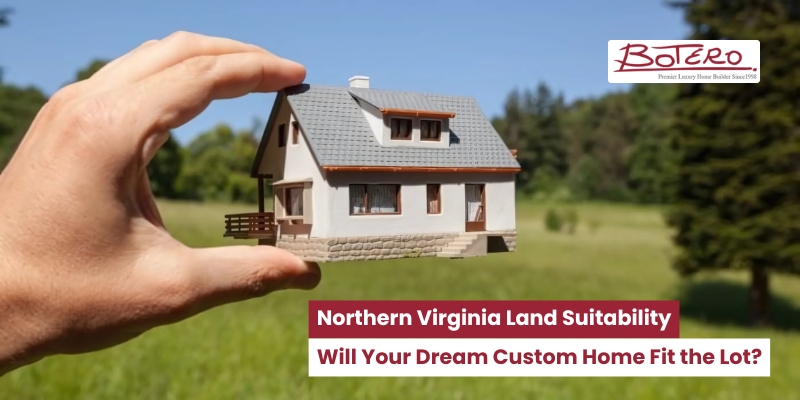
The first step toward custom homebuilding is land suitability. It determines the design, budget, and whether or not the house is livable in the long run. As Northern Virginia continues to surpass the need for custom homes, selecting the appropriate lot can be the difference between making or breaking your vision.
With this guide, you can determine whether your land is good enough to facilitate the custom home of your dreams.
What Is Land Suitability?
Land suitability is the process of evaluating a lot's physical, legal, and environmental features to establish whether it is suitable for a certain use, in this case, residential construction. It is the first fundamental process in custom home construction and assists buyers and constructors in making wise choices before the development of the foundation.
In Northern Virginia, the land suitability depends on various factors such as the soil, terrain, zoning requirements, and environmental limitations. The buildable space may be restricted by poor soil drainage, steep slopes, or protected wetlands, or site work may need to be expensive. By knowing these factors, you will be assured that your dream custom home will be built to the potential of the land.
Why Northern Virginia is Unique
The topography of Northern Virginia is varied, with gently hilly Loudoun County and more populated, urban environs in Alexandria. Such topographical differences may greatly affect site grading, foundation design, drainage arrangements, and general construction viability.
Also, every county has its zoning, building codes, and land use. Learning the differences between these jurisdictions before planning your custom home is important.
Key Land Factors That Impact Custom Home Building
1. Zoning and Building Codes
Building codes and zoning control what you may build and where. There are minimum lot sizes, setbacks along property lines, and floor area ratios.
Northern Virginia comprises various local jurisdictions, so it is imperative to conduct early due diligence. This ensures that your custom home design falls within all local municipalities.
2. Soil Composition and Drainage
Before building, soil testing must be done. Clay soils can swell, sand is unstable, and loam is mostly stable. Damages can also be caused by poor drainage or flood-prone areas, which may cause repair costs.
Finding out about soil types and water flow is a good idea for having a safe, stable basis for your custom house.
3. Land Slope and Grading Requirements
An inclined lot affects the type of foundation of your home, the price of your construction, and the amount of yard that can be utilized.
Grading is important in installing driveways, septic systems, and stormwater runoffs. In Northern Virginia, even modest grades may require engineered solutions.
4. Accessibility and Utilities
Access and available infrastructure are the keys to the value and feasibility of your lot. The legal access to roads, utility easements, and rights-of-way should be checked.
When constructing your dream house in Northern Virginia, determine the availability of the necessary services to prevent costly installations or developmental delays.
Custom Home Design Considerations for Lot Compatibility
Your vision should connect to the potential of the land, which is how designing your unique home in Northern Virginia begins.
Such details as the shape of the lot, the slope, the type of soil, and outside space all influence the structural choice, functionality, and long-term value. Sound design makes your dream house fit well and work well.
1. Matching Floor Plans to Lot Shape and Orientation
The design of a home must increase the amount of sunlight in the home, provide maximum privacy, and frame a scenic landscape. Vertical designs tend to be utilized in narrow lots, whereas sprawling layouts are used in wide lots.
The house's footprint can be aligned with the natural orientation of the lot to enhance the property's comfort, energy consumption, and aesthetics.
2. Foundation Options Based on Terrain
The ground is a very important factor in choosing a foundation. Slab-on-grade is appropriate in flat lots, whereas crawl spaces or basements are appropriate in sloped terrain.
Cost and risk are influenced by soil condition and drainage; geotechnical tests are necessary before construction. Selecting the appropriate foundation protects your home investment and strength.
3. Outdoor Living Spaces and Landscaping
Outdoor areas with functional uses, such as patios, pools, and gardens, must be well-integrated into the lot. Gradient sites can require retaining walls, and drainage problems will require erosion control considerations.
A properly planned landscape adds value to property, creates an attractive curb appeal, and aids in the free flow of indoor-outdoor living amid the diverse terrain of Northern Virginia.
Common Mistakes to Avoid When Choosing a Lot
- Ignoring Zoning and Permitting Hurdles: Your custom home dream can screech before you can even break ground when you fail to research your zoning laws or permit restrictions.
- Overlooking Site Preparation Costs: The value of such extra costs as grading, clearing, or access to utilities can greatly affect the general construction budget.
- Buying Based on Visual Appeal Alone: The view is beautiful, but it does not mean it is buildable. Consider soil, slope, and drainage when deciding to purchase.
- Failure to Consult the Professionals Early: It could be a very expensive surprise to forego early input from the builders and end up with an infeasible design constraint later.
Conclusion
Selecting the correct lot in Northern Virginia is the key to an effective custom home build. It is all about zoning the soil. It is essential to avoid the expensive pitfalls of not working with experienced professionals who know the region's intricacies. Want to determine the real potential of your lot? Contact Botero Homes now to get a perfect dream home from the ground up.

